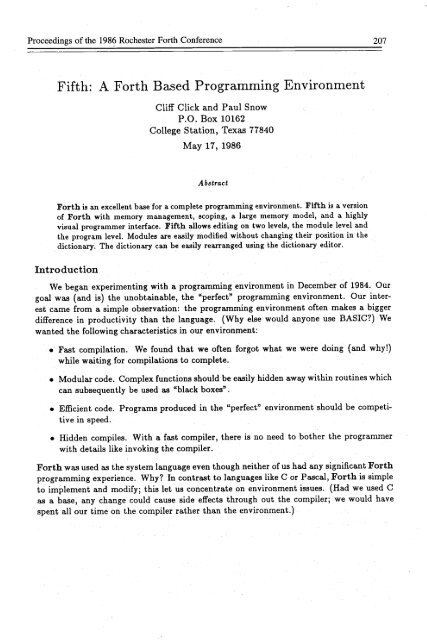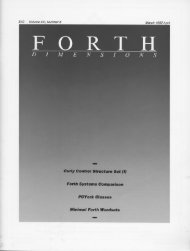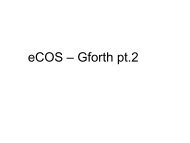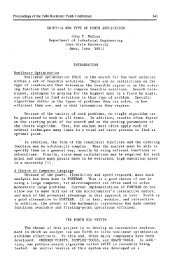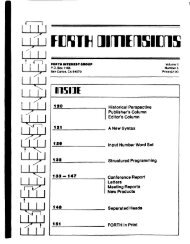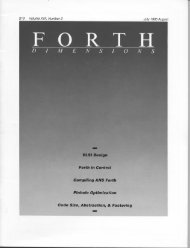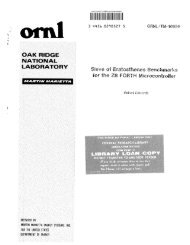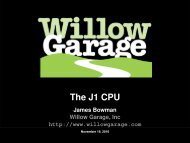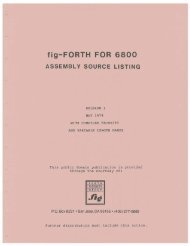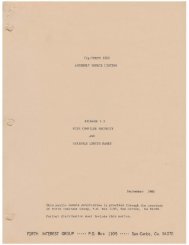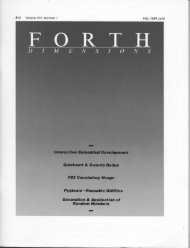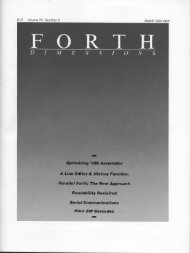Fifth: A Forth Based Programming Environment
Fifth: A Forth Based Programming Environment
Fifth: A Forth Based Programming Environment
You also want an ePaper? Increase the reach of your titles
YUMPU automatically turns print PDFs into web optimized ePapers that Google loves.
Proceedings of the 198~ Rochester <strong>Forth</strong> Conference 207<br />
<strong>Fifth</strong>: A <strong>Forth</strong> <strong>Based</strong> <strong>Programming</strong> <strong>Environment</strong><br />
Cliff Click and Paul Snow<br />
p.a. Box 10162<br />
College Station, Texas 77840<br />
May 17, 1986<br />
Abstract<br />
<strong>Forth</strong> is an excellent base for a complete programming environment. <strong>Fifth</strong> is a version<br />
of <strong>Forth</strong> with memory management, scoping, a large memory model, and a highly<br />
visual programmer interface. <strong>Fifth</strong> allows editing on two levels, the module level and<br />
the program leveL. Modules are easily modified without changing their position in the<br />
dictionar. The dictionar can be easily rearanged using the dictionary editor.<br />
Introduction<br />
We began experimenting with a programming environment in December of 1984. Our<br />
goal was (and is) the unobtainable, the "perfect" programming environment. Our interest<br />
came from a simple observation: the programming environment often makes a bigger<br />
difference in productivity than the language. (Why else would anyone use BASIC?) We<br />
wanted the following characteristics in our environment:<br />
. Fast compilation. We found that we often forgot what we were doing (and why!)<br />
while waiting for compilations to complete.<br />
. Modular code. Complex functions should be easily hidden away within routines which<br />
can subsequently be used as "black boxes" .<br />
. Effcient code. Programs produced in the "perfect" environment should be competitive<br />
in speed.<br />
. Hidden compiles. With a fast compiler, there is no need to bother the programmer<br />
with details like invoking the compiler.<br />
<strong>Forth</strong> was used as the system language even though neither of us had any significant <strong>Forth</strong><br />
programming experience. Why? In contrast to languages like Cor Pascal, <strong>Forth</strong> is simple<br />
to implement and modify; this let us concentrate on environment issues. (Had we used C<br />
as a base, any change could cause side effects through out the compiler; we would have<br />
spent all our time on the compiler rather than the environment.)
208<br />
The Journal of Fort Application and Research. Volume 4 Number 2<br />
As we looked into <strong>Forth</strong>, we found it was lacking a few features that we felt were<br />
essential to the environment we wanted to build. These include:<br />
. A large memory modeL.<br />
. Scoping.<br />
. Memory management.<br />
. A visual programming interface.<br />
. Source level tracing and breakpoints.<br />
The large memory model is a need recognized by many venders of 32-bit <strong>Forth</strong> systems.<br />
Scoping is needed to reduce name collsions. Convenient memory management gives programs<br />
easy access to dynamic memory; this is a feature needed in many AI applications.<br />
<strong>Fifth</strong>'s programming interface also relies heavily on dynamic memory. This interface is<br />
visual, allowing the programmer to inspect and change the dictionary. It gives the programmer<br />
a better "feel" for the state.of the system. This interface is enhanced by <strong>Fifth</strong>'s<br />
capability of selectively, tracing modules at the source leveL.<br />
Scoping<br />
We had one major goal for the scoping rules in <strong>Fifth</strong>: to help the programmer build a<br />
more accurate, functional "model" of a program. <strong>Forth</strong> makes use of linear scopingj words<br />
in a <strong>Forth</strong> system are. defined using previous words. Where as this kind of scoping is an<br />
improvement on global scoping, we wanted more flexibilityin building program "models"<br />
within <strong>Fifth</strong>.<br />
The IBM PC version of <strong>Fifth</strong> uses scoping rules similar to PascaL. Every modulel<br />
"owns" a subdictionary. Within a subdictionary, modules may only use the previous mod-<br />
ules. A search for a particular module ends at the first match (just like <strong>Forth</strong>). If the<br />
search is not satisfied in the subdictionary, a search is made starting with the owner of<br />
the subdictionary, and of the modules visible to the owner. This search continues until the<br />
last module, the root module, is reached. (The root module is the module that "owns" the<br />
dictionary.) If the module is not found, the module is undefined.<br />
<strong>Fifth</strong>'s scoping rules greatly improve the program "modeL" Modules are made more<br />
independent by "hiding" supporting modules in subdictionaries. A module for all appearancesmight<br />
seem to perform some complex function, but in reality, the function is<br />
performed by a set of modules, neatly hidden from view. This encourages small sets of<br />
code without cluttering the dictionary with words that are of little or no interest to most of<br />
the program. Faster compilation is a pleasant side effect of scoping since scoping shortens<br />
the search path.<br />
i At this point we should justify the use of the term "module" in the place of "word." A <strong>Fifth</strong> module<br />
includes not only its own code, but also a subdictionary containing (possibly) other modules and their code<br />
and subdictionaries. A module (and its subdictionary) may be saved to (and loaded from) disk separately.<br />
Modules in Fiflh make it easy to build and support libraries of useful routines which can be easily merged<br />
or blended in with other programs.
Proceedings of the 1986 Rochester Fort Cgnference<br />
<strong>Fifth</strong>'8 Dictionary<br />
Screens are a great idea; programs should not be written in large, linear files. But<br />
dealing with numbered screens can be painful too., <strong>Fifth</strong> gives each module its oW,n "screen,"<br />
which <strong>Fifth</strong> calls the module's text. A module's text contains only the source code for that<br />
number of lines,<br />
particular module. The text for a module is not restricted to a particular<br />
and is compressed to reduce memory requirements. But the biggest departure from screens<br />
is in where <strong>Fifth</strong> keeps the text for a module; itis kept in the dictionary with the execution<br />
code for the module. This means that a module owns its own source code as well as its<br />
execution code in the dictionary. Furthermore, the dictionary is not the current state of a<br />
program; it is the program.<br />
Memory management becomes necessary for a <strong>Fifth</strong> system because modules<br />
or shrink in size as they are modified. <strong>Fifth</strong> keeps modules in in a heap rather than a stack,<br />
and module references are indirect so the system can move them. <strong>Fifth</strong> lets the programmer<br />
manipulate modules in the dictionary while limiting side effects to other modules in the<br />
dictionary.<br />
Despite all the differences between the dictionaries of <strong>Fifth</strong> and <strong>Forth</strong>, there is little<br />
209<br />
may grow<br />
and<br />
difference in the philosophy. A module's behavioris stil similar to a word in <strong>Forth</strong>,<br />
<strong>Fifth</strong> encourages the programmer to build his programs from small, easily tested modules.<br />
<strong>Fifth</strong> simply extends the <strong>Forth</strong> philosophy by simplifying the interface. This interface is<br />
the subject of the next section.<br />
<strong>Fifth</strong>'8 Dictionary Editor<br />
The dictionary editor is the key to <strong>Fifth</strong>'s programming environment. It<br />
is the pro-<br />
gram that allows the programmer to freely inspect and modify individual modules and/or<br />
their position in the dictionary. The programmer can concentrate on a module, debugging<br />
it where it is in the program, with changes coming into effect immediately and automat~<br />
ically. Or the programmer can concentrate on the organization of the program, moving<br />
related modules to logical positions, deleting unneeded modules, or adding new modules.<br />
In <strong>Fifth</strong> the dictionary takes an active part in defining the program, directly expressing<br />
the relationships between modules.<br />
A programming environment should have some method of maintaining libraries of useful<br />
functions. In <strong>Fifth</strong>, libraries of routines are maintained using the dictionary editor. It<br />
enables the programmer to save out a module (and its subdictionary) independent of the<br />
rest of the dictionary. Conversely, modules may be loaded back into the dictionary at any<br />
point. In this way the dictionary editor supports easy maintenance of libraries of routines<br />
which in turn increases reusability of code.<br />
Automatic Compiler<br />
Compilation is an integral part of <strong>Forth</strong>, and is done when a screen is loaded or code is<br />
typed. In <strong>Fifth</strong>, the text for each module is loaded into the dictionary without compiling it.<br />
In addition to the text, each module is given a program stub. Executing a module executes<br />
this program stub which in turn invokes the compiler on the module. (This program stub<br />
is given to all modules "marked" as uncompiled.) If the compilation is successful, the<br />
generated code replaces the program stub, and is executed. The first execution of a module<br />
invokes the compiler first, then later execution of the module executes the module's code<br />
directly. The programmer never has to invoke the compiler.
210 The Journal of <strong>Forth</strong> Application and Research Volume 4 Number 2<br />
<strong>Fifth</strong> uses a number of strategies to reduce the compilation time of a program. One<br />
strategy is analogous to lazy evaluation, where compilations are delayed until a module is<br />
actually executed (lazy compilation?). Another is the observation that compiles normally<br />
follow editing; <strong>Fifth</strong> employs an incremental compilation scheme where the compiler is<br />
called automatically upon leaving the editor. This compilation is normally restricted to<br />
the modified module; modifications are reflected almost instantly, even in large programs.<br />
There are operations that cause <strong>Fifth</strong> to mark a number of modules as uncompiled, causing<br />
noticeable compile times. These include inserting, deleting, or moving a module.<br />
The programmer is not restricted to <strong>Fifth</strong>'s automatic compilation; the programmer<br />
can force compiles. This can be done from the dictionary editor, or from within a program.<br />
A module can actually force the compilation of another module. <strong>Fifth</strong> modules can use<br />
conditional compilation to increase execution speed, and recompile a module if conditions<br />
change.<br />
Summary<br />
<strong>Fifth</strong> encourages the isolation of a module from the rest of the program by placing<br />
supporting modules in subdictionaries. The programmer can easily inspect and change<br />
the relationships between modules using the dictionary editor. This improves the maintenance<br />
and flexibility of a program. The scoping rules and dictionary editor team up to<br />
eliminate the need for vocabularies and special schemes for handling libraries of routines.<br />
<strong>Fifth</strong>'s automatic compilation of modules greatly reduces compile times, and reduces the<br />
programmer's burden of maintaining the state of the program.<br />
An Implementation of <strong>Fifth</strong><br />
We have developed a version of <strong>Fifth</strong> that runs on the IBM PC. It uses 32b arithmetic,<br />
a large memory model, floating point, graphics, source level tracing, and MS-DOS files.<br />
The text editor, dictionary editor, and primitives are memory resident. "Online" help is<br />
available for all primitives. This version is a Freeware program.<br />
We are also have an Amiga version which includes improvements in the flexibility of<br />
<strong>Fifth</strong>. A generic version written in C is in the works to get <strong>Fifth</strong> up and running on any<br />
system with a good C compiler (e.g. UNIX).


